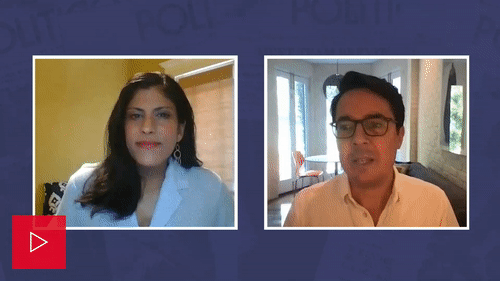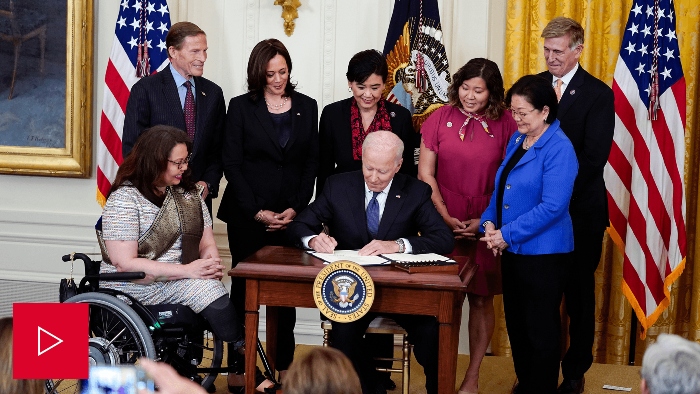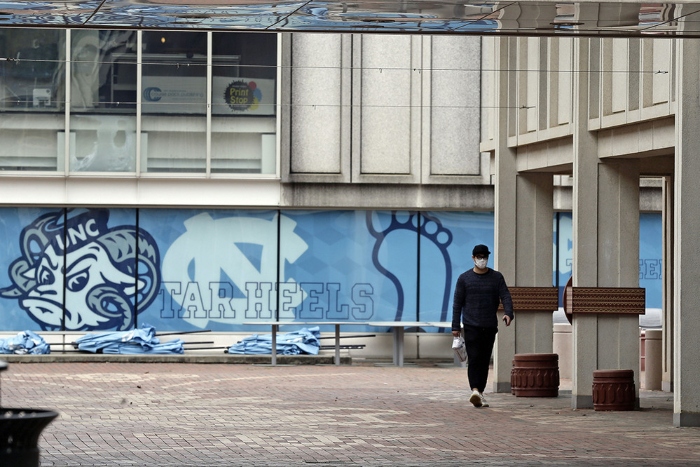| | |  | BY RENUKA RAYASAM | Presented by Facebook | With help from Blake Hounshell and Myah Ward TIGHTROPE — President Joe Biden has spent the first few months of his term holding together a sprawling caucus of progressives and moderates, trying to be both the old-school politician eager to hash out deals with Republicans and a champion of big spending and social justice. This week that balancing act got a lot trickier. Israel approved a ceasefire with Hamas today after the worst fighting between the two groups since 2014. The de-escalation in tensions comes after Biden pressured Israeli Prime Minister Benjamin Netanyahu to end the violence. Still, the latest round of fighting has revealed how the bipartisan consensus around the decades-old conflict has crumbled. Progressives are far more outspoken about their support for Palestine, challenging Biden’s long-held views. In a four-minute speech today Biden emphasized Israel’s right to defend itself, and pledged to Netanyahu his “full support” to replenish the nation’s Iron Dome defense system. Also this week, the Supreme Court decided to take up a Mississippi abortion ban case that challenges the precedent of Roe v. Wade. The move will force Biden to decide how far he wants Congress to go in securing abortion rights ahead of the 2022 midterm elections. He’s largely stayed quiet on abortion, but progressives want him to speak up. Watch Renu and Playbook author Ryan Lizza talk about what this week tells us about how Biden is navigating the new dynamics in the Democratic Party.
| 
| Welcome to POLITICO Nightly. Next week Renu will moderate a panel about the maternal mortality crisis in Illinois. Register to watch here. Reach out with news, tips and ideas for us at rrayasam@politico.com, or on Twitter at @renurayasam.
| |
A message from Facebook: The internet has changed a lot since 1996 - internet regulations should too
It's been 25 years since comprehensive internet regulations passed. See why we support updated regulations on key issues, including:
– Protecting people’s privacy
– Enabling safe and easy data portability between platforms
– Preventing election interference
– Reforming Section 230 | | | | | | |
“I think what we have seen — and this really is unprecedented — is athletes emerging as a political bloc, and as a voting bloc, that matters. … We’ve talked about hockey moms in the past, we’ve talked about soccer moms in the past — well, now we’re just talking about the athletes.” — DR. AMY BASS, PROFESSOR OF SPORT STUDIES AT MANHATTANVILLE COLLEGE, TO IAN WARD AND CALDER MCHUGH IN “HOW DEMOCRATS LEARNED TO LOVE ACTIVIST ATHLETES,” RUNNING FRIDAY MORNING IN POLITICO MAGAZINE |
| | |
| | SUBSCRIBE TO WEST WING PLAYBOOK: Add West Wing Playbook to keep up with the power players, latest policy developments and intriguing whispers percolating inside the West Wing and across the highest levels of the Cabinet. For buzzy nuggets and details you won't find anywhere else, subscribe today. | | | | | | | SOCIAL INSECURITY — Rep. John Larson (D-Conn.) has been warning about Social Security’s insolvency for years. He has been pushing for a proposal that would boost benefits for the first time in nearly 40 years. The Social Security Administration’s annual trustee report, which is expected to drop any day now, will likely warn that the program will run out of funds within the next 15 years. Social Security’s looming insolvency used to be the talk of Washington, but these days it has faded into the background. Renu spoke with Larson, the chair of the House Ways and Means Social Security Subcommittee, about his plans to put the issue back on the congressional agenda. This interview has been edited. Do you know what this year’s trustee report might tell us about the impact of the pandemic on Social Security’s solvency? We’ve been monitoring it very closely, but the latest thing the actuaries are saying is that the pandemic might not have quite the dramatic effect. While birth rates may be lower, over 500,000 people have died as well. They thought that there might be a notch that would be created for people born in 1960, but they seem to think that the recovery of the economy and the rescue plan may have diminished that as well. The bottom line is Covid did lay open what existed already: Over 5 million Americans retired in the country who are living in poverty, who have paid into Social Security and get a below poverty level check. When we look at this — and God rest his soul before he passed — John Lewis had indicated this is the next civil rights issue. The people impacted the most are women and specifically women of color. Republicans have argued that your proposal would unfairly boost taxes on millennials and small business owners. Do you think your bill would boost benefits to older Americans at the expense of younger ones? [Social Security] is the nation’s No. 1 anti-poverty program for the elderly and children as well. They end up getting more and have something they can rely on. It’s not an entitlement; it’s an earned benefit. No one should retire into poverty after working all their lives. I was in the insurance business and went to the Aetna insurance school. We learned that there were three legs of the financial stool, including pensions, personal savings and Social Security. It’s a guarantee. Congress has punted on this issue for a while — the last major overhaul to the program was in 1983. With so much on the agenda, do you think lawmakers will have the bandwidth to take this up? Covid is going to come and go, and the rescue plan will be gone. But what will remain permanent will be Social Security. And what Social Security needs is congressional attention. It is Congress’ responsibility to act, and Congress has to do a novel thing here — they have to vote. We’re looking to drop a bill that will contain the administration’s best thinking and the legislators’ best thinking. We’re going to have hearings on it.
| 
Example of the Social Security cards Rep. John Larson had made for all members of Congress. | Courtesy of John Larson's office | I have produced for every member of Congress their own little Social Security card. It will tell them specifically how many people are receiving Social Security in your congressional district, then say how much money that means comes into your district on a monthly basis. As we all know, those dollars go right back into the community. The cards are done, and I am waiting to send them out.
| |
| |  
| | | | | — McCarthy says he’d testify before independent Jan. 6 commission: House Minority Leader Kevin McCarthy said today that he would be willing to testify before an independent commission investigating the Jan. 6 insurrection about his conversation with then-President Donald Trump as the attack on the Capitol unfolded.
| 
| — Biden signs anti-Asian hate crimes legislation: Biden signed into law today anti-hate crime legislation in response to the surge of attacks on Asian Americans during the Covid-19 pandemic.“Every time we’re silent, every time we let hate flourish, we make a lie of who we are as a nation,” Biden said before signing the bill two days after Congress finished passing it. “We cannot let the very foundation of this country continue to be eaten away like it has been in other moments in our history and happening again.” — U.S., Russia at odds over military activity in the Arctic: The Biden administration is leading a campaign against Russian attempts to assert authority over Arctic shipping and reintroduce a military dimension to discussions over international activity in the area. — Biden proposes huge IRS funding boost to snag tax cheats: Biden’s plan would be phased in to give the agency time to absorb the additional resources. In a report today, the Treasury Department said the IRS would hire thousands of new enforcement agents under its plan, but its staff would never grow by more than a “manageable” 15 percent each year.
| | STEEL CITY SHAKEUP — Managing editor Blake Hounshell emails: My hometown, Pittsburgh, is about to do something that’s never happened in its 226-year history: elect a Black mayor. On Tuesday, state Rep. Ed Gainey knocked out two-term mayor Bill Peduto in the Democratic primary, an upset that all but guarantees Gainey will win the general election. The outcome was stunning to many, as Peduto had wide support among Pittsburgh’s elites. He welcomed big tech companies like Google and Uber; he touted flashy neighborhood redevelopment projects; he gabbed on conference panels about the latest new urbanist trends. Yet Peduto couldn’t escape the changing politics of the moment — namely, the ripple effects of George Floyd’s death and America’s reckoning with policing and racism. He had taken some heat for the way the city’s police handled last year’s Black Lives Matter protests, and probably got too closely identified with the flashy tech and real estate transformation he so often promoted. To me — a transplant to Pittsburgh whose first exposure to the city’s treacherous neighborhood dynamics was a riot at my largely middle-class, mixed-race high school — what’s most noteworthy is that only a quarter of the city’s population is Black. So Gainey, a longtime legislative aide and city development specialist, clearly won over thousands of white voters with his calls to “improve the quality of life for everybody.” In a city that remains one of the country’s most segregated, one whose external brand has been dominated by its European immigrant communities — think pierogies, brats, steins of beer, Heinz ketchup — Gainey’s election is a political watershed. He seemed humbled by the weight of that history as he accepted Peduto’s concession this week, telling his supporters, “One person can’t change a city. A city is changed when we all come together.”
| |
| | SUBSCRIBE TO "THE RECAST" TODAY: Power is shifting in Washington and in communities across the country. More people are demanding a seat at the table, insisting that politics is personal and not all policy is equitable. The Recast is a twice-weekly newsletter that explores the changing power dynamics in Washington and breaks down how race and identity are recasting politics and policy in America. Get fresh insights, scoops and dispatches on this crucial intersection from across the country and hear critical new voices that challenge business as usual. Don't miss out, SUBSCRIBE . Thank you to our sponsor, Intel. | | | | | | | Nightly asks you: CDC guidelines and the president say we can drop our masks if we’re vaxxed. But to Nightly editor Chris Suellentrop, the real sign of our pandemic spring was the return of self-service fountain drinks at his local Panera. What small change have you witnessed recently that surprised and delighted you? Send us your answer in our form, and we’ll include select responses in our Friday edition.
| | | |
| | | | 
The University of North Carolina, pictured here, has denied Nikole Hannah-Jones, a Pulitzer Prize-winning journalist for The New York Times Magazine, a tenured position. | Gerry Broome/AP Photo | CAROLINA BLUES — Nightly’s Myah Ward emails: My ears perked up this week when I learned that my alma mater, the University of North Carolina, had denied Nikole Hannah-Jones, a Pulitzer Prize-winning journalist for The New York Times Magazine, a tenured position. The decision went against UNC’s typical practice: Since the university began working with the Knight Foundation in 1980, Knight chairs at UNC — the position Hannah-Jones would hold — have been tenured and, like her, have come from professional journalism jobs. The reasons for the decision aren’t clear. The chair of the university’s board of trustees said today that the journalism school made the decision to offer a non-tenured contract to Hannah-Jones, which she accepted. But the dean of the journalism school, Susan King, says she and her colleagues were enthusiastic about a tenured position, and that she was told the board objected because Hannah-Jones came from outside academia. Another board member told the website NC Policy Watch the decision came down to “politics.” The Republican-controlled North Carolina Legislature appoints the university system’s board of governors, which in turn holds a lot of power over the university’s board of trustees. Hannah-Jones has faced backlash from conservatives, and some historians, for her work on The Times’ 1619 Project, which reignited the ongoing debate about slavery’s legacy in America — and for which she won her Pulitzer. What’s happening to Hannah-Jones, a UNC alum herself, is sickening to many faculty, students and outside observers. But it’s not surprising to those who know the institution — especially students, faculty and staff of color, who have felt endangered by the university’s decisions time and time again. To take one example: In 2018, after students toppled Silent Sam , a Confederate monument, the university decided to donate the statue to the Sons of the Confederate Veterans and agreed to fund a $2.5 million trust to house the statue safely off campus, infuriating professors and students. (A judge overturned the agreement last year.) Or look at how the university failed to address low-wage service workers’ safety concerns when fully reopening campus last fall during the pandemic. The board of trustees often rules in ways that don’t align with the politics of a liberal student body and its professors. Now, the Hannah-Jones decision has inflamed those tensions again. Kate Sheppard, one of 40 faculty members from the journalism school who signed a statement condemning the move, tweeted that “not granting tenure to @nhannahjones is entirely based on racist, reactionary and anti-academic-freedom ideology at the highest levels.” The president of the Knight Foundation, which endows the chair to which Hannah-Jones was appointed, said the foundation would “urge the trustees of the University of North Carolina to reconsider their decision within the timeframe of our agreement.” I wouldn’t be shocked if the board reverses its decision. The university has been known to backtrack once criticism stains that Carolina blue. When coronavirus case counts surged, UNC switched to remote learning last summer. But in some sense, it doesn’t really matter at this point. Who knows if Hannah-Jones will still want to work at a university that denied her what she has earned? Who knows how many Black and brown professors — voices the university and the j-school desperately need — will look the other way when choosing between UNC, and another university that will give them the respect they deserve?
| |
A message from Facebook: Why Facebook supports updated internet regulations
2021 is the 25th anniversary of the Telecommunications Act of 1996, the last major update to internet regulation. It’s time for an update to set clear rules for addressing today's toughest challenges.
See how we’re taking action on key issues and why we support updated internet regulations. | | | Did someone forward this email to you? Sign up here. | |
|
| | Follow us on Twitter | | | FOLLOW US | |
| |
No comments:
Post a Comment
Note: Only a member of this blog may post a comment.